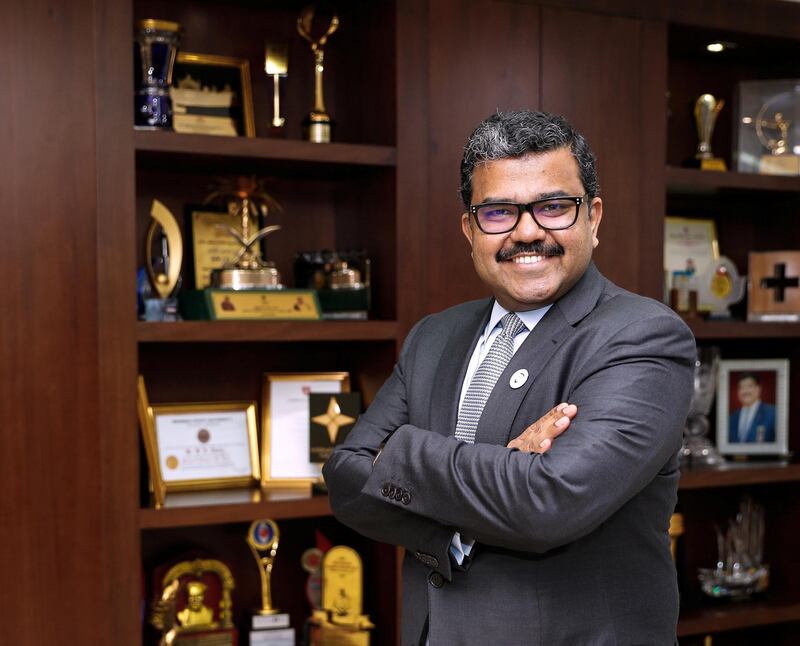UAE Exchange, one of the oldest money transfer houses in the Middle East, expects to grow the volume of remittances it handles by up to 10 per cent in 2018, driven by improved economic growth forecasts, rising liquidity in the region and new acquisitions, its chief executive said.
"Over the last year and a half there has been an increased amount of remittance activity worldwide and we are seeing that reflected in our business with substantial, double-digit growth overall," Promoth Manghat told The National. Its remittances are expected to grow by 8 to 10 per cent year-on-year in 2018, he added.
Global remittances grew 7 per cent to $613 billion in 2017, according to the World Bank.
The US dollar comeback in recent months following a period of weakness has boosted Asian currencies in particular. UAE Exchange has seen “a good flow of money” to India, Pakistan and the Philippines, as well as Egypt and elsewhere.
“People are taking advantage of improved economic sentiment and the last three months in the UAE has been especially positive,” Mr Manghat said. He said the government’s plans to relax foreign ownership rules and offer long-term visas to some expats by the end of this year would “create new jobs in emerging industry sectors, resulting in increased economic activity and higher remittance flows”. Rising liquidity in the GCC would also boost remittance volumes, he said.
UAE Exchange, which was founded in 1980 by India-born businessman BR Shetty, operates in 45 markets worldwide and handled close to $30bn of remittances last year, representing 46 per cent of the global remittances market. It is a private company and does not break down volumes by region.
In 2016, the company launched a $250 million to $300m acquisition spree to boost its technology and logistics capabilities in a competitive market. It has spent 40 to 45 per cent of its investment pot to date and is in advanced talks with three firms on deals to complete this year, Mr Manghat told The National.
Previous deals include the acquisition of online remittance house Remit2India and a tie-up with US blockchain firm Ripple, and early-stage investments in technology start-ups Swych and the UAE’s Souqalmal. In 2015, the company bought UK exchange house Travelex for $1.1bn.
“We’ve been doing organic investments in technology firms and will continue to do so, focusing on opportunities to enhance our capacity and better serve our customers,” Mr Manghat said. “We are gaining good momentum.”
Acquisitions will be overseen by UAE Exchange’s new holding company, Finablr, set up by Mr Shetty in April this year to house all of his financial services interests, which include UAE Exchange, Travelex, Xpress Money, Remit2India, Unimoni and Ditto.
____________
Read more:
[ UAE's Central Bank downgrades 7 exchange houses for money-laundering offences ]
[ Remittances by UAE expatriates rise 17% in the first quarter ]
[ Exclusive: NMC Health eyes profit increase in 2018, fuelled by $2bn warchest ]
____________
UAE Exchange had been planning an initial public offering of its merged Travelex entity on the London Stock Exchange, where Mr Shetty’s other major business interest NMC Health is listed. The plan now is to list the entire Finablr holding company “when the time is right”, Mr Manghat said.
"We have the prequalification for London," Mr Shetty, chairman of Finablr, told Reuters in April. He confirmed to The National that London remains the preferred location for a listing. "It's better to go there, where I have investors who trust me, than to an unknown market," he said but declined to say when the share sale might happen or what percentage would be listed. Mr Manghat said banks had yet to be hired for the process. "We are in the very early stages."
In the meantime, Finablr will cement its role as the investment and innovation lead for the financial services firms under its umbrella, while from a customer-facing point of view they will continue to operate as separate brands.
FInablr also plans to launch a string of "innovation hubs" focusing on research and development in areas of ‘fintech’ such as blockchain – which the company views as potentially useful in speeding up the money transfer process and reducing costs. The first hub will launch in London in the next three months, followed by the opening of a blockchain research laboratory in Dallas.
Money transfer houses such as UAE Exchange are subject to increasingly rigorous regulations as part of the global fight against money laundering, and Mr Manghat said he welcomed this.
The UAE Central Bank’s decision to downgrade the licences of seven exchange houses in the emirates this month is a positive thing for UAE Exchange because it shows “we have a hands-on regulator that enables the industry to operate in a professional manner”, the chief executive said.






